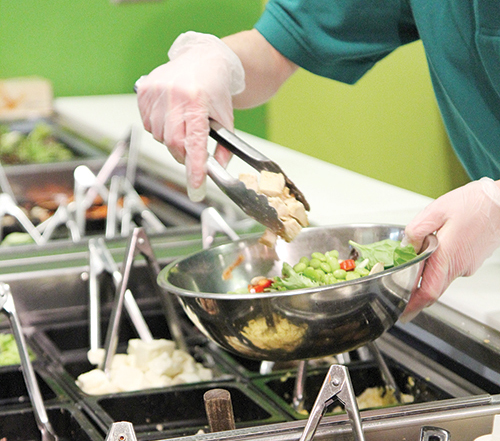
With students needing vegan, gluten-free, and other dietary-sensitive food options, PSU Dining Services employees say they try to compensate and adjust accordingly.
However, some students feel that food service provider Aramark doesn’t go far enough to provide quality meals for students with nonconventional diets.
In a recent settlement with Lesley University in Massachusetts, the Justice Department found that food allergies can be considered a disability, giving students on meal plans legal leverage to act on concerns about whether the foods they need are available.
With more students eating vegan and vegetarian, the demand for diet-specific foods is very real and relevant at PSU.
Tim Kellen, Aramark’s PSU Food Service director, believes that PSU Dining is adequately catering to students’ dietary needs. He noted that Victor’s Food Court in the Ondine Residence Hall posts dietary information to inform students of the ingredients in the food.
“We’re always adding gluten-free items, and vegan and vegetarian items,” Kellen said.
There are avenues for students to inform kitchen managers and Aramark about specific needs, such as by posting comments in Victor’s or going directly to staff.
“I think we have a good variety, but we can always improve. We need [students with specific diets] to tell us what they like to eat, what they don’t like to eat,”
Kellen said.
He also noted that Aramark has stopped using peanut oil in response to students who are allergic to peanut products.
“We always have gluten-free bread, the deli bar is always there, the salad bar is always there,” Kellen said.
There are those who still feel that Aramark doesn’t provide quality food, despite the company’s attempts offer a diverse selection.
Brandon Spek, a senior sociology major, works at PSU’s Food For Thought Cafe, which caters to vegans, vegetarians and all-around healthy eaters. Though no longer a vegan or vegetarian, Spek described his early days at PSU and his experience with PSU Dining Services: “I had to eat cheese pizza, and I didn’t feel like the vegan food that was offered was any better or healthier,” he said.
While Aramark may provide options that lack dairy or animal products, the quality of food isn’t as good as it could be, according to Spek.
“It’s not so much about providing vegan, veggie or gluten-free food, but more [about] providing healthy food. I’m sure Aramark [has] those goals, but I think that the way that they are structured makes it hard for them to buy local food,” he said.
Spek and others have described Food For Thought as a safe heaven for students with food sensitivites, as well as those craving healthy, local food.
“Vegans would starve without Food For Thought,” said Sonya Friedman, a sophomore anthropology major and a vegan.
Aramark does provide locally grown produce, but Kellen couldn’t give a specific estimate of the percentage without a finalized comprehensive report, which is currently being drafted.
“Vegans are probably the toughest [to provide for], with no dairy and no meat. That’s probably our [biggest] challenge, so we try to work with them as much as we can…we do have options for them,” Kellen said.

